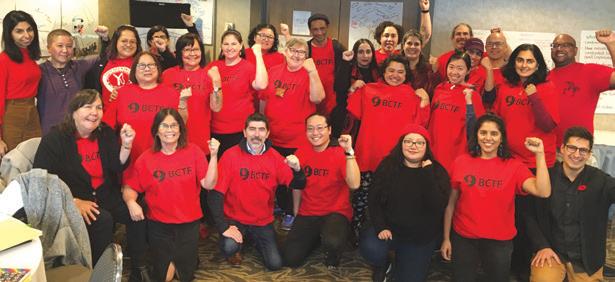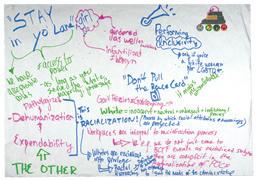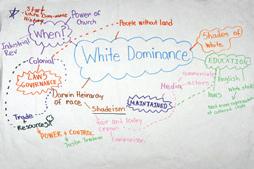
7 minute read
Reflections on the 2nd Annual Issue Session on Racism
important misconceptions in order to fully understand the impact of racism on everyone. The first misconception is individualism: the idea that racism is limited to discrete acts of individuals. The second is the racist/non-racist binary: the notion that racism is intentional and carried out only by bad people. By putting these misconceptions aside, we acknowledge that racism is systemic, which means it is entrenched in our institutions and societal structures.
Facing that woman in the mirror and acknowledging that I am part of the very systemic oppression I thought I was fighting was only the first step in a new feminist journey which requires humility, vulnerability, and forgiveness. Not every white woman who identifies as a feminist practices white feminism, but only white women benefit from it. Learning how to forgive myself instead of constantly asking my Black, Indigenous, People of Colour (BIPOC), and LGBTQ2S+ friends and colleagues to do this emotional labour enables me to move forward instead of wallowing in useless guilt and resentment.
Robin DiAngelo’s concept of white fragility, “the inability of white people to tolerate racial stress, leading them to weaponize their hurt feelings and be indignant and defensive when confronted with racial inequality and injustice,” has no place on this journey. The perennial question must be, “How can I do better?” Trying to strike a balance between stepping up and stepping back is often confusing and difficult. When to speak, when to listen? When to do the work, when to ask for help? When to compete, when to support? Sometimes this involves figuring out how to be. Practice, mistakes, and renewed commitment are at least part of the answer.
As a member of the Status of Women Action Group on the Committee for Action on Social Justice, I have had the opportunity to collaborate with members of the Antiracism and LGBTQ2S+ Action Groups, which has opened a broader spectrum of justice for us to work towards. I am excited to be learning and growing with an expanding group of sisters because the reward for undertaking this work is impactful. I get so much more out of this collaboration than I could have imagined and look forward to spending more time celebrating being an intersectional feminist rather than a white one. I have learned recently that the BC NDP Women’s Rights Committee passed a resolution to change its name to Women and Gender Rights Committee. The BCTF might wish to entertain a similar motion.
We choose to be a social justice union, and with that choice comes the responsibility to bring about the changes that make us deserving of that description. Being nice to people of colour is not enough. We sometimes let our good intentions exempt us from deviating from the perceived norm in our actions and practice. Deeply understanding our privileges as white women will enable us to advance awareness and tangible action. Maybe the old patriarchal proverb “man may work from sun to sun, but a woman’s work is never done” could evolve into “educators may work from sun to sun, AND social justice will be done.”
By Linda Frank, CASJ Antiracism Action Group and Boundary teacher
During the first week of November 2019, the BCTF hosted its second Issue Session on Racism. Members who identify as people of colour and had attended the first session were invited, as well as 20 new participants. It was wonderful to reconnect with teachers who had participated in the last session and to meet new attendees.
Our speaker, Dr. Shauneen Pete, Indigenous Resurgence Coordinator from the Department
of Indigenous Education at the University of Victoria, started the day by providing us with some background about herself. As an Aboriginal student, Dr. Pete experienced a disconnect with the education system; she encountered discrimination and her cultural teachings were ignored. Teachers presumed that she would not amount to anything even though her parents were professionals.
After a somewhat troubled youth, Dr. Pete’s resilience and perseverance led her to her calling. In her current role at the University of Victoria, she teaches student teachers about antiracism and how to be an advocate for racialized people. She has contributed to systemic change in education by raising student teachers’ awareness of discrimination and how people of colour struggle daily with systemic racism. Understanding the role of conscious and unconscious bias will hopefully change the way racialized teachers and students are treated in schools.
After her inspiring introduction, Dr. Pete gave us our first assignment. We were asked to develop a definition of racism through the lens of people of colour. After lengthy discussions, we worked in groups to make posters to illustrate our collective thoughts. Most groups identified a hierarchy where people of colour find themselves placed at the bottom. Another common theme was the impact of meritocracy: the belief that success comes uniquely through hard work and is not influenced by other aspects of one’s identity, including race. Participants identified specific impacts of racism, including barriers to finding employment, obtaining good wages, finding a home, and accessing leadership roles, along with the more general impacts of inequality, harassment, and oppression.
We also discussed Kimberlé Crenshaw’s notion of intersectionality, which describes how multiple aspects of one’s identity in addition to race— including socioeconomic status, gender identity, sexual orientation, and disability—determine our experience of oppression. A key conclusion was the need to work towards a fairer social playing field. It
is harder for people of colour to reach their potential because very often they are dismissed as not having the same abilities as white people.
The second assignment was to look at what it means to be white and to have the privilege and power that come with this designation. We live in a world of white privilege where society has developed unwritten rules and regulations to hold onto political and social power. These structures help perpetuate colonialism.
White fragility, the feeling of discomfort and defensiveness white people experience when confronted with notions of racism, is an effective tool that helps white people to deny their role in racism. It is not until we have developed an awareness and understanding of these issues that we can solve problems of racism in society. To achieve these goals, antiracism teachings need to be part of the curriculum from an early age in order to create equity and inclusion in our schools and communities. People of colour need to have allies to help break down the bonds of oppression and colonialism.
Racism has been bubbling up to the surface recently with the media increasingly shining the spotlight
on racist incidents. While many people think that freedom of speech trumps everything—believing it is legal and acceptable to make racial slurs and demeaning comments—it is becoming socially and morally unacceptable to do so. The media has become a platform to debate racism.
People of colour are beginning to have allies speaking on their behalf instead of having people turn a blind eye. One example is the recent and momentous decision of the National Hockey League to fire Calgary Flames coach Bill Peters due to his use of racial slurs towards one of his players ten years ago. Starbucks was also on board when mandatory antiracism training was provided to their employees following a racist incident. Police forces are providing antiracism training for their officers as well. Most recently, black Canadian rapper John River accused the healthcare system of racism because he was misdiagnosed as having depression even though his pain was excruciating. It was not until his family reached out to social media for help that he received the medical treatment he needed.

On the final day of our meeting, we worked on resolutions aimed at improving our workplace and union spaces for racialized teachers and to advocate for government policies to help create a more just society. We need to break down the legacies of colonialism by advocating for human rights and privileges.



The report on the second BCTF Issue Session on Racism, including recommendations from this session that were carried at the December 2019 and January 2020 meetings of the BCTF Executive Committee, is available on the Equity and Inclusion web pages of the BCTF website.









